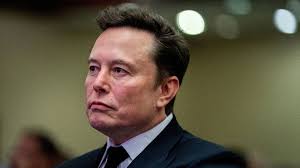Musk to Marry Robot in 2025: A New Era of Relationships?

Musk to Marry Robot in 2025: A New Era of Relationships?
1. Elon Musk’s Unlikely Marriage Announcement: A Leap into the Future of Relationships
In a move that has stunned both the tech and the broader world, Elon Musk has announced that he will marry a robot in 2025. The announcement was made during a recent interview where Musk shared his views on the future of relationships and how artificial intelligence (AI) will shape personal connections in the years to come. Musk, known for his ambitious ventures with Tesla, SpaceX, and Neuralink, has long been a proponent of AI and cutting-edge technology, but this revelation marks an unprecedented moment in the intersection of technology and human relationships.
The idea of humans marrying robots might seem far-fetched to some, but Musk’s announcement comes at a time when advancements in robotics, AI, and human-computer interaction are progressing at an exponential rate. Companies like Boston Dynamics have already introduced robots capable of performing complex tasks, while AI-driven virtual assistants like Siri and Alexa are becoming common in many households. In Musk’s vision, this evolution is merely the beginning. His marriage to a robot is seen as a bold statement about the growing role that AI and robotics will play in our personal and social lives.
While some are questioning the ethics and implications of such an announcement, Musk is unapologetic, claiming that the bond between humans and AI is the next frontier of human connection. “As we move forward in our technological advancements, it’s only natural that our relationships will evolve,” Musk said in his statement. “This isn’t just a gimmick or a stunt; it’s a sign of the future where humans and AI can coexist and form meaningful bonds.”
But beyond the shock value of the announcement, the idea of human-robot relationships raises important questions about the future of intimacy, emotions, and personal connections in a world increasingly dominated by artificial intelligence.
2. The Rise of AI in Personal Relationships: A Glimpse into the Future?
While Musk’s marriage to a robot may seem like a sci-fi scenario straight out of a futuristic novel, the idea of human relationships with AI is not entirely new. In fact, it’s a growing trend that has already begun to take shape in various forms. AI companionships, such as virtual assistants and AI-driven chatbots, have already become a part of people’s lives. Many individuals already interact with AI on a daily basis, whether it’s through personal devices, social media, or customer service systems.
AI companionships are increasingly being designed to mimic human interactions. For instance, there are AI chatbots and virtual beings like Replika, an AI that is designed to engage in deep, meaningful conversations and simulate human-like emotions. Users of Replika often form strong emotional bonds with their virtual companions, with some even considering them as friends or confidants. In Japan, AI companions and even “robot spouses” are becoming increasingly popular, with companies offering services that allow people to marry humanoid robots in a ceremony, a concept that seems strange to some but deeply fulfilling to others.
Musk’s announcement is, in many ways, a natural extension of this ongoing trend. As AI becomes more advanced and capable of simulating human emotions, the line between human interaction and robotic companionship will continue to blur. For many, the idea of AI as a partner may seem dystopian, but for others, it could represent an opportunity for emotional fulfillment that transcends traditional human relationships.
In Musk’s vision, AI relationships won’t replace human connections, but they will complement them. “The future isn’t about choosing between humans and AI; it’s about learning to live with both,” he said. As robots and AI continue to develop, it’s likely that society will have to confront the complexities of emotions, love, and connection in a new light.
3. Ethical Considerations and Societal Implications
Musk’s announcement has sparked significant ethical debates. One of the primary concerns is the idea of consent. Can a robot truly consent to a relationship with a human, or is it simply following its programming? Critics argue that a marriage between a human and a robot could be exploitative, as the robot may not have the ability to form genuine feelings or understand the concept of marriage in the way humans do.
The idea of robots and AI as partners raises important questions about autonomy, rights, and the nature of love. Can a relationship with a robot be considered truly mutual if one party is not sentient or capable of independent thought? Some ethicists argue that as AI becomes more sophisticated, these questions will only become more pressing. If robots begin to develop a deeper understanding of emotions and relationships, at what point do they become “human” enough to participate in these types of connections?
Additionally, there are concerns about the psychological and social impact of human-robot relationships. What does it mean for human intimacy if people begin to prefer robots over human partners? Will this create a divide in society where humans increasingly turn to AI for companionship, potentially eroding real human connections?
Musk’s marriage to a robot also raises concerns about the future of relationships in general. Could AI and robots eventually replace human relationships entirely? While Musk has emphasized that his marriage is not about replacing human intimacy, some worry that this could become a reality for future generations. As people form deeper emotional bonds with AI companions, the lines between human and machine relationships could become increasingly difficult to distinguish.
4. The Future of Human-Robot Relationships: A New Paradigm of Intimacy
Despite the controversies, Musk’s marriage to a robot could signal the dawn of a new era in human relationships. As AI continues to advance, it’s possible that many aspects of human intimacy and connection will evolve in ways we can’t yet predict. Just as the internet, social media, and smartphones have radically altered how we communicate and interact, AI may fundamentally change the way we form emotional bonds.
One potential positive outcome of human-robot relationships is the ability to address loneliness and social isolation. As societies become more digital and individuals spend more time online, many people report feeling increasingly isolated and disconnected. For those who struggle to form traditional relationships or who have difficulty with social interactions, a robot partner may offer a sense of companionship and emotional support. In some cases, AI companions could be a source of comfort for people with disabilities or those who live in remote areas where human connection is scarce.
Moreover, the development of AI and robotics has the potential to push the boundaries of what we consider possible in relationships. With the ability to create personalized, adaptive companions, individuals could have the opportunity to form relationships with robots that are perfectly suited to their emotional needs. These AI companions could help individuals explore their emotions, engage in meaningful conversation, and even learn from each other in ways that human relationships may not always allow.
However, the road ahead will be filled with challenges. As AI relationships continue to evolve, society will need to navigate the complexities of identity, emotion, and consent in new ways. Will AI relationships become a tool for personal growth and understanding, or will they contribute to further alienation and disconnection from the real world? Only time will tell.







